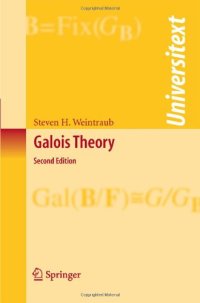
Ebook: Galois Theory
Author: Steven H. Weintraub (auth.)
- Tags: Field Theory and Polynomials, Group Theory and Generalizations, Number Theory
- Series: Universitext
- Year: 2009
- Publisher: Springer-Verlag New York
- Edition: 2
- Language: English
- pdf
The book discusses classical Galois theory in considerable generality, treating fields of characteristic zero and of positive characteristic with consideration of both separable and inseparable extensions, but with a particular emphasis on algebraic extensions of the field of rational numbers. While most of the book is concerned with finite extensions, it discusses algebraic closure and infinite Galois extensions, and concludes with a new chapter on transcendental extensions.
Key topics and features of this second edition:
- Approaches Galois theory from the linear algebra point of view, following Artin;
- Presents a number of applications of Galois theory, including symmetric functions, finite fields, cyclotomic fields, algebraic number fields, solvability of equations by radicals, and the impossibility of solution of the three geometric problems of Greek antiquity.
Review from the first edition:
"The text offers the standard material of classical field theory and Galois theory, though in a remarkably original, unconventional and comprehensive manner … . the book under review must be seen as a highly welcome and valuable complement to existing textbook literature … . It comes with its own features and advantages … it surely is a perfect introduction to this evergreen subject. The numerous explaining remarks, hints, examples and applications are particularly commendable … just as the outstanding clarity and fullness of the text." (Zentralblatt MATH, Vol. 1089 (15), 2006)
Steven H. Weintraub is a Professor of Mathematics at Lehigh University and the author of seven books. This book grew out of a graduate course he taught at Lehigh. He is also the author of Algebra: An Approach via Module Theory (with W. A. Adkins).
Galois theory is a mature mathematical subject of particular beauty. Any Galois theory book written nowadays bears a great debt to Emil Artin’s classic text "Galois Theory," and this book is no exception. While Artin’s book pioneered an approach to Galois theory that relies heavily on linear algebra, this book’s author takes the linear algebra emphasis even further. This special approach to the subject together with the clarity of its presentation, as well as the choice of topics covered, has made the first edition of this book a more than worthwhile addition to the literature on Galois Theory. The second edition, with a new chapter on transcendental extensions, will only further serve to make the book appreciated by and approachable to undergraduate and beginning graduate math majors.